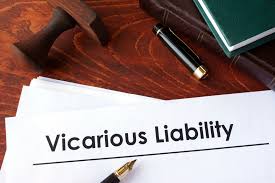 As businesses expand, they look for new ways to transport their product or deliver a service to others. Thus, they hire drivers to drive their vehicles to do so. Sometimes when a driver is in route, they get into a car accident that may or may not be their fault, but when it is the employee’s fault there is a certain law that may apply to a defendant’s case. This law is called vicarious liability or respondeat superior.
As businesses expand, they look for new ways to transport their product or deliver a service to others. Thus, they hire drivers to drive their vehicles to do so. Sometimes when a driver is in route, they get into a car accident that may or may not be their fault, but when it is the employee’s fault there is a certain law that may apply to a defendant’s case. This law is called vicarious liability or respondeat superior.
What is vicarious liability and how do I know if it applies to my case?
This concept may apply when an employee causes an accident to an injured party during the course of employment. In order to prove the employer is liable for the employee’s negligent act, the plaintiff has the burden of proof to show that at the time of the employee’s act, the driver was: an employee of the employer and the employee acted in the scope of his employment.
To prove the first element, the analysis then shifts to determine if the negligent driver is an independent contractor or an employee. There are some factors that can help decide this issue such as, the right to control how the work gets done, how tools or equipment are supplied, who decides the hours, and the method of operation. The answers to these factors will determine if the employee was truly an employee or an independent contractor. It is helpful to note that if the negligent driver was an independent contractor, the employer will not be liable for the driver’s bad act.
To prove the second element, the plaintiff will have to make an argument that the negligent act fell “within the scope of the employee’s general authority in furtherance of the employer’s business and for the accomplishment of the object for which the employee was hired.” Mayes, 236 S.W.3d at 757.
For example, a driver for a flower company was making deliveries to various locations. As the driver was on his way to another location, he pulls out his phone to respond to messages via text. Since the driver focused on his phone rather than the road, he ran a stop sign and hit another vehicle causing that driver injuries. The plaintiff may argue that since the negligent driver was working under the scope of his employment at the time of the accident and his duty of delivering the flowers is the job the driver was hired to do, he may have a claim against the employer as well as the employee himself for the direct cause of the accident.
Now, it is important to note that the facts of the case are important to consider as the attorney decides whether this rule of law will be applicable to one’s case or not. If you believe the negligent driver worked for an employer at the time of the accident, be sure to address this concern with your attorney.
If you have experienced an accident caused by a negligent motorist and you believe the driver was working under their scope of employment, it is crucial to contact a skilled attorney like Eric Reyes to represent you. Eric Reyes has been a practicing attorney in the area of personal injury for 30 years. His litigation team has been with him for 20+ years, so he and his team work well and efficiently to get a result for the case. Throughout his time focusing on personal injury law, he has met the requirements to be a Board Civil Law. His knowledge of personal injury can help you determine the best way to resolve your matter. Please give our office a call at (817) 332-1522 for further information.
 Fort Worth Injury Attorney Blog
Fort Worth Injury Attorney Blog

